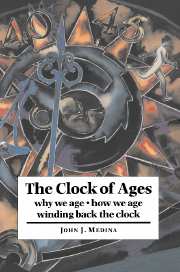Book contents
- Frontmatter
- Contents
- Preface
- To Doris Medina 1929–1993
- PART ONE Who ages?
- PART TWO How do we age?
- INTRODUCTION
- 4 How the skin and hair age
- 5 The aging of bones, muscles and joints
- 6 The aging of the brain
- 7 How the heart ages
- 8 The aging of the lungs
- 9 What happens to the digestion
- 10 How the senses age
- 11 The aging of the reproductive system
- PART THREE Why do we age?
- Further reading
- Index
11 - The aging of the reproductive system
Published online by Cambridge University Press: 05 August 2012
- Frontmatter
- Contents
- Preface
- To Doris Medina 1929–1993
- PART ONE Who ages?
- PART TWO How do we age?
- INTRODUCTION
- 4 How the skin and hair age
- 5 The aging of bones, muscles and joints
- 6 The aging of the brain
- 7 How the heart ages
- 8 The aging of the lungs
- 9 What happens to the digestion
- 10 How the senses age
- 11 The aging of the reproductive system
- PART THREE Why do we age?
- Further reading
- Index
Summary
These words could only come from the mind of the world's most famous seducer: ‘Life is a wench that one loves, to whom we allow any condition in the world, so long as she does not leave us.’
The comment was penned in the last months of the life of Giovanni Casanova, the legendary lover of the 18th century. Fittingly, he met his end after no fewer than 11 bouts with venereal disease, and died because of complications from one of them. But he paid for his dalliances in more than just mortality. Because of these ailments, his amorous career actually stopped 13 years before his life expired. He spent those years eating food in the kitchens of European nobility, causing one biographer to quip: ‘since he could no longer be a god in the gardens, he became a wolf at the table.’
The father of countless illegitimate children was himself born a bastard in the Venice of 1725. Although he never fully established his paternity, he did know his mother, a famous actress of the day named Zanetta Farusi. He grew up in her household, half-brother to a number of other children whose paternity could never be fully established, either.
Casanova's first encounter with the sensuous life occurred at age 11, in the experienced arms of the woman who normally gave him a bath. His teenaged years were full of heterosexual explorations, where he finetuned his history-making skills of seduction.
- Type
- Chapter
- Information
- The Clock of AgesWhy We Age, How We Age, Winding Back the Clock, pp. 209 - 224Publisher: Cambridge University PressPrint publication year: 1996



